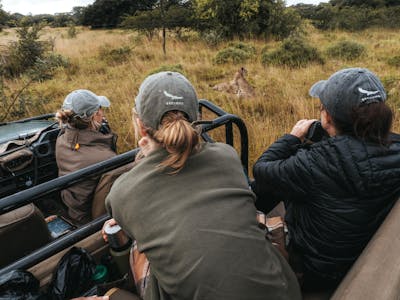Make it your own
Want something a bit different? You can customise any trip.

Phinda is one of the great success stories of African wildlife conservation. Unlike many private safari reserves, most of the land is owned by the local community which means everyone works together to protect the wildlife – and everyone benefits from the park’s success.
As a Phinda volunteer, you’ll play a vital role in this amazing story. As part of the reserve’s research team, you’ll help to manage thriving populations of rhino, lion, cheetah, elephant, pangolin and many other species. You’ll have countless chances to observe these animals in their natural habitat and by working behind the scenes, you’ll see a side of Phinda that tourists don’t usually experience.
You will also have the unique opportunity to monitor black rhino as part of Phinda’s involvement with the pioneering WWF Black Rhino Range Expansion Project.
Find out more in the video below - you can click 'CC' for subtitles and find chapters in the progress bar!



As a conservation volunteer at Phinda, you’ll experience life behind the scenes on one of the largest private reserves in South Africa and get closer to the wildlife than you ever could as a tourist.
Assist in managing this critical rhino population through daily monitoring and periodic horn trimming, in order to deter poachers.
By working with the wildlife in Phinda, you’ll support major international conservation organisations.
Most of the Phinda reserve is owned by the local community so your placement will help to support this unique initiative.
You'll play a valuable role and work with a team of dedicated conservation professionals who support the research department at Phinda.
Due to its growing cheetah population, Phinda plays a pivotal role in cheetah conservation throughout the whole of southern Africa.
The Phinda reserve is situated within one of the world’s biodiversity hotspots known as the Maputaland Centre of Endemism.
As a volunteer on our Phinda Wildlife Research Experience, there’s always something to do. Your role will be varied and hands-on. Depending on the animals being managed and researched, you’ll be involved in the following activities:
To maintain the perfect balance of species within the reserve, Phinda’s conservationists keep a close watch on population numbers.
Careful management of the wildlife is vital to Phinda’s conservation success.
As Phinda is mostly owned by the community and is a major employer in the area, you’ll play a vital role in supporting the local people.
As well as gaining hands-on experience, you’ll also learn about the conservation, ecology, biology and behaviour of Phinda’s wildlife.
Most of our travellers like to combine multiple projects to create a tailor-made trip. The combined price of projects is cheaper than the individual projects added up online.
We offer combinations of conservation projects, transport between them, accommodation and travel insurance as you require. We are a travel operator, not an agent, which means we take full responsibility for your trip which will be financially protected through ABTA and ATOL.
We will discuss your options and tailor your experiences so you can realise your dreams.
Related Projects and Experiences
Make it your own
Want something a bit different? You can customise any trip.

Visit three different projects in two countries to truly understand wildlife conservation in Africa
View details for From Famous Kruger To Remote Okavango
Experience for yourself the adrenaline-fueled world of wildlife capture and relocation
View details for Game Capture And Relocation Experience
Explore a variety of animals in the Okavango Delta, home to the largest elephant population on Earth
View details for Okavango Wilderness Project
Get a unique behind-the-scenes experience in one of the largest and most important conservation areas in Africa
View details for The Vikela Kruger Conservation Experience